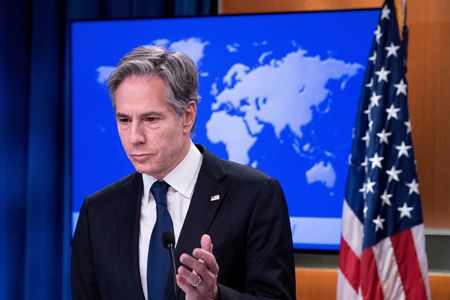
With Blinken in Pacific, Marshall Islands says talks on U.S. military access ‘stalled’

By David Brunnstrom and Michael Martina
WASHINGTON (Reuters) – Even as America’s top diplomat visits the Pacific region seeking to counter China’s growing power and influence, the Washington ambassador of the tiny Marshall Islands said talks aimed at renewing agreements covering access for the U.S. military have stalled.
The envoy, Gerald Zackios, told Reuters there had been no talks on renewing its Compact of Free Association Agreement (COFA) with the United States since the end of the Trump administration in 2020, in spite of the priority the Biden administration has attached to boosting Indo-Pacific engagement. Zackios said this was because Washington had not appointed a negotiator empowered by President Joe Biden to discuss key issues beyond U.S. economic assistance, including remuneration for the legacy of massive U.S. nuclear testing on the islands, the presence U.S. military bases, and climate-change mitigation.
A senior official of the Biden administration told Reuters last week it plans to launch a new Pacific Islands initiative with allies and partners and to finalize COFA negotiations with the Marshall Islands, the Federated States of Micronesia and Palau, but gave no timeframe. The compacts are due to expire in 2023 in the former two states and in 2024 in Palau. “They’ve stalled,” Zackios said in reference to the Pacific republic’s negotiations with Washington. “In the case of the Marshall Islands, I would use that word.” “My view is that these negotiations are stalled until we get a presidential appointed special envoy who will have the authority to discuss key issues that are important to the Marshall Islands.”
Katie Porter, a Democratic representative who has taken up the issue of the Pacific islands in the U.S. Congress, wrote to Biden’s Indo-Pacific Coordinator Kurt Campbell in September calling for the appointment of a full-time presidential representative to manage the COFA negotiations. A spokesperson for Porter, chair of the House Subcommittee on Oversight and Investigations of the Committee on Natural Resources, said she had yet to receive a formal response.
The White House and State Department did not respond to Reuters requests for comment. U.S. Secretary of State Anthony Blinken is in Australia this week for a meeting on Friday of the Quad grouping with Japan, India and Australia, which is expected to include discussion of the Pacific islands. On Saturday, he is due in Fiji, where he will seek to reassure Pacific island leaders that Washington and its allies are committed to tackling climate change and providing security and COVID vaccines as China steps up its aid and influence.
The United States conducted 67 nuclear weapons tests in the Marshall Islands from 1946 to 1958 and islanders are still plagued by the health and environmental effects as a result. The tests included the “Castle Bravo” at Bikini Atoll in 1954 – the largest U.S. bomb ever tested and 1,000 times more powerful than the one that destroyed Hiroshima in 1945.
In recent years, Beijing has upped its military and police links with Pacific island nations, while also providing loans and infrastructure. Campbell warned last month warned of “strategic surprise” in the Pacific – apparently referring to possible Chinese ambitions to establish Pacific-island bases. He said the United States had not done enough to help the region and there was a very short amount of time, working with partners like Australia, New Zealand, Japan and fellow Pacific power France, “to step up our game across the board.”

















POST COMMENTS (0)